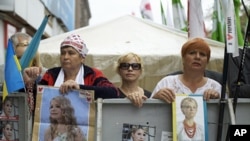It may sound like the battle of the bands, but loudspeakers in Kyiv are dueling over democracy. Our correspondent reports from the tent camps outside the trial of Yulia Tymoshenko, the opposition politician known the world over for her trademark peasant braid.
Today, Ukraine’s democracy can be heard five blocks away.
Booming down the central avenue of Kyiv, the capital, towers of loudspeakers proclaim the innocence or guilt of Yulia Tymoshenko, the nation’s former prime minister.
Twenty meters away, in a 19th century courthouse, Ms. Tymoshenko, Ukraine’s leading opposition politician, grimly sits through another day of her trial for abuse of power.
On the street, rival camps give rival views of the trial.
With a red marker, Olga Mola, a 30-year-old school teacher, paints ‘I heart Yulia’ posters.
She says if Ms. Tymoshenko is convicted, it will be the end of democracy and the rule of law in Ukraine.
Ms. Tymoshenko is not on trial for stealing money. She is on trial for signing a gas deal with Russian President Vladimir Putin in January 2009. The deal ended a crippling mid-winter gas shortage in Ukraine and Eastern Europe, but now prosecutors charge that she abused her powers signing a 10-year deal at high prices.
Near Olga’s white tent, Miroslav Nabyl, a 33-year-old scrap metal worker, complains that Europe is turning its back on Ms. Tymoshenko.
He charges that Europe was grateful three years ago when Ms. Tymoshenko acted to end the Russian gas cutoff. Now, he asks, "Why is Europe quiet?"
France, Germany and Sweden recently criticized the trial. Political analysts say that a conviction could provoke the European Union to delay a free trade pact with Ukraine.
From Washington, Obama administration officials also criticize the trial, saying it is an example of selective justice and only opposition figures are on trial for corruption in Ukraine.
Five steps from the Tymoshenko tent camp, anti-American rhetoric blares from loudspeakers at the camp for supporters of President Viktor Yanukovych. Speakers charge the United States with interfering in Ukraine’s internal affairs.
At the Yanukovych camp, a guard in a black windbreaker physically shoves me back to the sidewalk. A second attempt, at a different entrance, is more successful.
As young men in black jackets and skinhead haircuts wave anti-Tymoshenko banners, Ludmila Soloviova, a 29-year-old organizer, agrees to talk:
Ludmila says that a politician who steals should not be able to hide from justice just because he or she is an opposition leader.
Taped to the black banners of Ludmila’s compound are the slogans “Theft of the People’s Property: Shame” and “Tymoshenko leader of an organized criminal group.” In a dig at the fashion sense of Ukraine’s former prime minister, one poster reads “Louis Vuitton Medals: The Brand of the Opposition.”
Far from the passions of the street, Alyona Getmanchuk directs the Institute of World Peace, a Kyiv research organization. She says President Yanukovych made a big political mistake by prosecuting Yulia Tymoshenko.
Getmanchuk says that by putting Ms. Tymoshenko on trial, Ukraine’s president has united the opposition, drawn sympathy for his main political rival, and, unwittingly, started her political rehabilitation.
On the foreign policy side, she says, Ukraine’s president is uniting East and West.
Europe and the United States are critical of the trial. But criticism also comes from the Kremlin.
Moscow, she says, opposes the trial because it calls into question a gas supply deal signed by Prime Minister Putin. In addition, by criticizing the trial, Moscow focuses attention on a weak spot in Kyiv’s drive to cut a trade deal with Europe - the fragile state of democracy in Ukraine.
Ukraine Trial Uniting Ukraine's Political Opposition
- By James Brooke




